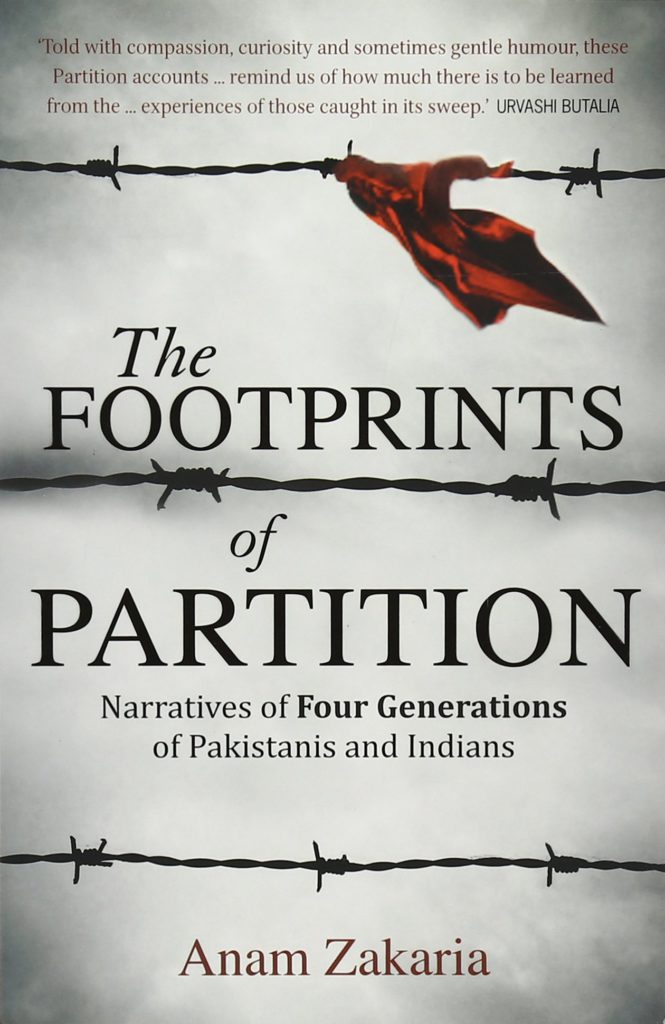
About the book
The Partition of British India and the subsequent creation of two antagonist countries is a phenomenon that we are still trying to comprehend. Millions displaced, thousands slaughtered, families divided and redefined, as home became alien land and the unknown became home. So much has been said about it but there is still no writer, storyteller or poet who has been able to explain the madness of Partition.
Using the oral narratives of four generations of people — mainly Pakistanis but also some Indians — Anam Zakaria, a Pakistani researcher, attempts to understand how the perception of Partition and the ‘other’ has evolved over the years. Common sense dictates that the bitter memories of Partition would now be forgotten and new relationships would have been forged over the years, but that is not always the case. The memories of Partition have been repackaged through state narratives, and attitudes have only hardened over the years. Post-Partition events — wars, religious extremism, terrorism — have left new imprints on 1947. This book documents the journey of Partition itself — after Partition.
Praise for the book
‘Told with compassion, curiosity and sometimes gentle humour, these Partition accounts give life to the dry documents of history; they remind us of how much there is to be learned from the lived experiences of those caught in its sweep.’—Urvashi Butalia, author of The Other Side of Silence: Voices from the Partition of India, and Partition: The Long Shadow
‘Drawing upon rich layers of oral histories, archives and fast fading voices, Anam Zakaria paints a rather unforgettable image of what the earlier generations underwent, and in some cases continue to do. It is now for the third-generation Pakistanis and Indians to undo the toxic past and ensure that it doesn’t repeat itself. This is why The Footprints of Partition is such an essential book of the future.’—Raza Rumi, journalist and author of Delhi by Heart
‘A moving, inspiring and thoughtful first-person account of a young woman’s process of “unlearning” about “the enemy” and learning to embrace and accept the “other” as fellow human beings. The process involves a rich and varied series of experiences that Anam Zakaria shares openly with readers, lightly interspersed with historical context and her own insightful analyses.’—Beena Sarwar, writer and documentary filmmaker
‘Anam’s effort in writing this book has been painstaking, sensitive, realistic, constructive and necessary. She has performed a distinct service.’—Rajmohan Gandhi, biographer and journalist
‘Anam Zakaria probes residue of the horrific events of ’47, through sensitively conducted conversations. She sifts through memories, long supressed or glossed over. These vastly varied chronicles are compelling, each in its own way. They help to piece together a people’s history, often at odds with the grand narratives of the state.’—Salima Hashmi, writer and artist
‘Anam Zakaria’s book on Partition brings a kind of freshness and insaniyat to our understanding of the event. It is about young people in Pakistan trying to break free from inherited prejudices, and longing to find, like many in India and elsewhere, secular spaces of justice and peace in the near future. We need, urgently, a new politics of hope.’—Dr Alok Bhalla, author of Stories about the Partition of India and Partition Dialogues
‘The book is a must-read for people on either side of the border. It might inspire them to end the rivalry between the two countries and forge a new relationship.’—The Telegraph
‘. . . a book remarkable for its honesty.’—Hindustan Times
‘Her narrative foregrounds her interviews, and her writing aptly conveys the emotional registers of the speakers.’ —The Caravan
‘Through her lens, Partition appears to be more than just a violent tragedy.’—Express Tribune
‘Ms (Anam) Zakaria has shown just why states must resist the temptation to rewrite history with pernicious goals.’—Business Standard
‘Zakaria’s book seeks to be the Pakistani analogue to (Urvashi) Butalia’s own magnum opus The Other Side of Silence.’—The Sunday Guardian
‘A story completely different from the present political discourse of hate that is spewed in both India and Pakistan, a story of love, brotherhood, communal harmony and friendship.’—Tehelka
‘Zakaria challenges the notion of predestined animosities between the two hostile states. With the rise of belligerent nationalism and worryingly antagonistic elements on both sides of the border, this challenge is an important one.’—Dawn

